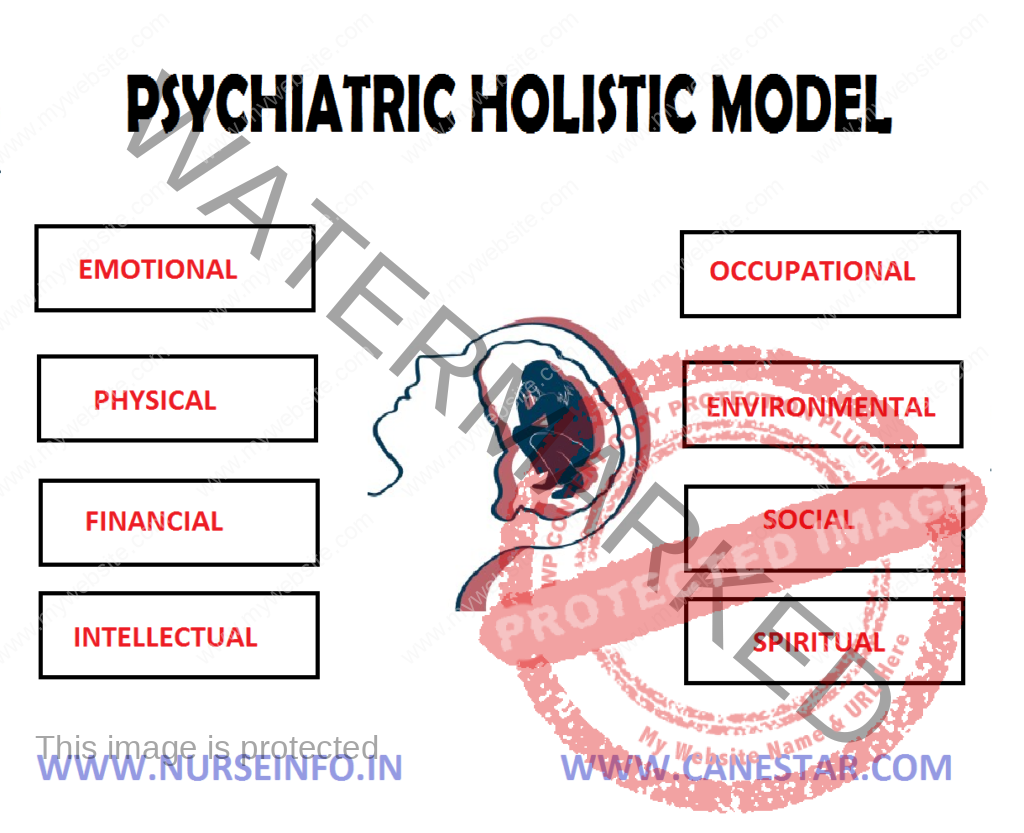HOLISTIC MODEL
The holistic view of the patient, with the body and soul seen as inseparable, and the patient viewed as a member of a family and community was central to Nightingale’s view of nursing. The primary goal of nursing is to help patients develop strategies to achieve harmony within themselves and with others, nature and the world. Integrative functioning of the patient is physical, emotional, intellectual, social and spiritual dimensions are emphasized. Each person is considered as a whole, with many factors contributing to health and illness.
Major Concepts
Five major concepts are generally accepted as premises of holistic health care philosophy:
- First, each person is multidimensional; one’s physical, emotional, intellectual, social and spiritual dimensions are in constant interaction with each other:
- The physical dimension involves everything associated with one’s body, both internal and external.
- The emotional dimension consists of affective states and feelings, including motor behavior associated with emotion, the experienced aspect of emotion, and the physiological mechanisms that underlie emotion
- The intellectual dimension includes receptive functions, memory and learning, cognition and expressive functions.
- The social dimension is based on social intersection and relationships, more so the global concept of culture.
- The spiritual dimension is that aspect of a person from which meaning in life is determined; through which transcendence over the ordinary is possible.
- The second premise of holistic care philosophy is that the environment makes significant contributions to the nature of one’s existence. Each person’s environment consists of many factors that are influential in that person’s quality of life. Consequently, people cannot be fully understood without consideration of environmental factors such as family relationships, culture, and physical surroundings. Individuals interact with their unique environments through all dimensions, based on subjective experience as well as external stimuli.
- The third premise is that each person experiences development across his life cycle; in each stage of life, the individual experiences and confronts different issues or similar issues in different ways. One’s experience of each stage of life, forms the basis for further development as one moves through the life cycle.
- Fourth, the holistic healthcare model maintains that stress is a primary factor in health and illness. Any event or circumstance can act as a stressor. Regardless of the source, stress has an impact on the whole person. Examples of stressors directly affecting the physical dimension include stressors associated with genetic factors, physiological processes, and body image. Emotional stress may result from any experience or situation. Examples include poor physical conditions, perceived social inequities, a significant loss, intellectual incompetence, and a sense of meaninglessness. Stressors affecting the intellectual dimension may include factors that interfere with receptive functions, memory and learning, cognitive functions, and expressive functions. Social stressors may arise from interactions and relationships with other people, as well as from more general societal and cultural factors. Stressors affecting the spiritual dimension include all such factors that interfere with one’s ability to meet spiritual needs.
- Fifth, people are ultimately responsible for the directions their lives take and the lifestyles they choose. Within a holistic framework, people are viewed as active participants in and contributors to their health status; they are willing to learn from illness and strive towards healthier choices.
Recognizing all human dimensions encourages a balanced and whole view of a person. Each facet of an individual is important and contributes to the quality of life experience. All dimensions are intricately interwoven, and the person as a whole functioning organism is more than the simple combination of dimensions. The holistic model emphasizes that all the dimensions of the individual should be considered when planning and instituting care.


